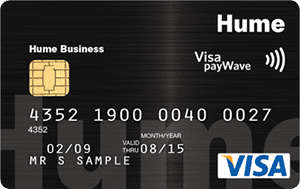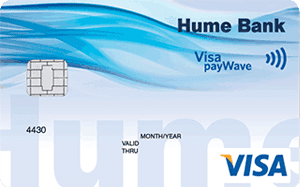Hume Bank Credit Cards

Hume Bank offers a wide range of personal and business banking products, covering everything from home loans and insurance, to credit cards, car loans and financial planning. But, while it may have the range of a bigger bank, Hume Bank says it doesn’t have the attitude of one. In fact, Hume Bank prides itself on the fact that it’s not like other banks.

We found no credit cards using your selected criteria
Update your filters to get more cards to display. Reach out if you are having any problems.
Hume Bank
One reason for this is that Hume Bank is a mutual. As a mutual organisation, it's owned by members. That means members have a say in how the bank is run. It also means that there are no external shareholders demanding a share of the bank’s profits. Instead, Hume Bank’s profits can be re-invested to benefit members.
These benefits are realised in a number of ways. First up, mutuals such as Hume Bank tend to offer lower fees on their financial products, with more competitive rates than bigger banks usually provide. This helps to save members money. Hume Bank also focuses on service, providing more personalised service and support than the big banks can typically offer.
And, of course, there is community. While big banks have a national presence, smaller mutuals like Hume Bank tend to serve smaller areas. Hume Bank is a great example of this. Having served the Albury-Wodonga region for more than 60 years, Hume Bank retains strong ties to its community. As it is owned by its members – and its members are locals – this is a bank that works towards a better community for all who live in the area.
As the bank itself says, “Our local knowledge and expertise are second to none”.
Where did Hume Bank come from?
Hume Bank started out life as the Hume Co-operative Building & Investment Society, established in 1955. The society was founded by a group of Albury residents who were dissatisfied with the availability of funds for housing. Wanting to help local people purchase their own homes, Hume provided a local alternative for housing finance.
By the end of 1955, Hume had 58 customers, with loans of £43,164 and deposits of £37,990. From there, the society expanded and grew, becoming Hume Permanent Building Society in 1969, and Hume Building Society in 1988. It wasn’t until 2014 that the mutual became Hume Bank, after seeking approval from its customers and the governing body, the Australian Prudential Regulation Authority (APRA) in 2013.
Today, Hume Bank has an extensive branch and ATM network, and employs more than 150 staff to meets the needs of over 60,000 customers.
What does Hume Bank have to offer?
If you’re on this site, it’s likely you’re interested in applying for a credit card. Within its range of financial products, Hume Bank has two credit cards designed for personal use, and one business credit card as well. Here’s what you can expect from Hume Bank’s credit cards, so you can decide whether this mutual is right for you.
Hume Bank Value Visa Card: As a low rate card, this card has a low rate on purchases and no annual fee, and would likely appeal to cardholders who want to keep costs down. It has received a five-star rating by Canstar for offering outstanding value, and has been recognised by Mozo Experts Choice Awards as a ‘Best Value No Annual Credit Card’.
Hume Bank Clear Visa Card: Offering cashback rewards on card spending, this card is a low cost option that would work well for cardholders who want access to no frills rewards. While extras are limited, cardholders can keep costs down with up to 55 days interest free on purchases, and a low annual fee that is waived after making a minimum annual spend.
Hume Bank Business Visa Credit Card: Helping small business owners manage their cash flow more effectively, this card offers a low secured rate on purchases, and a low annual fee that is waived after a minimum yearly spend. Accountholders can have up to nine cards with individual spend limits, earning cash back rewards on business spending.
Recently Asked Questions
Something you need to know? Ask our credit card expert a question.
Ask a question
Hi, I’m a personal finance expert who loves to help you out! I’ll answer your question within a business day. Pinky swear.















Ella
15 December 2019Roland
18 December 2019